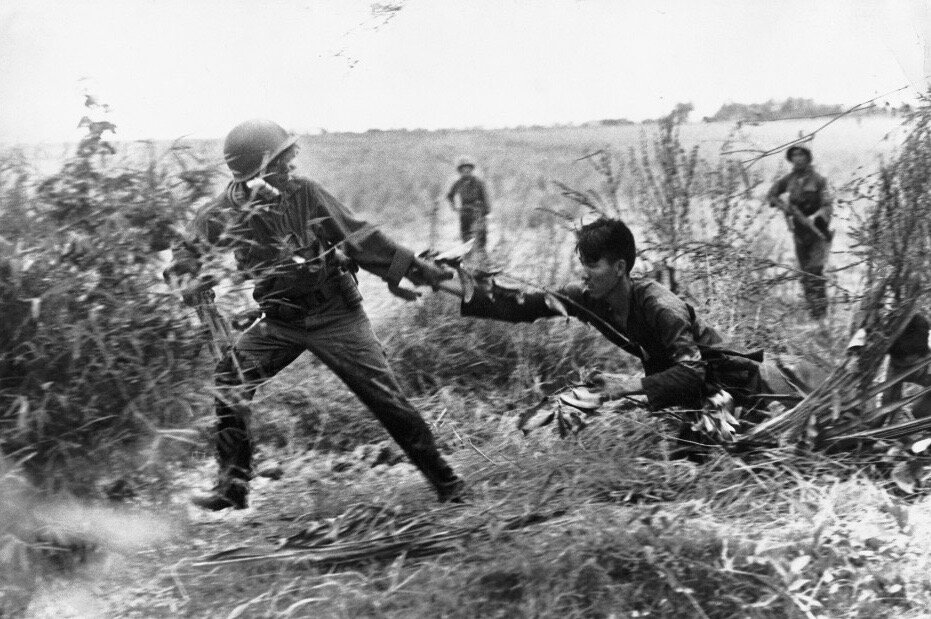Irreconcilable Truths | Don McCullin’s Gaze On The Victims Of War
“ALL THE THINGS I PHOTOGRAPHED WOULD HAVE BEEN PLAIN ATROCITY SITUATIONS, BUT I HAD TO CREATE AN IMAGE THAT WOULD CARRY A MESSAGE.”
Don McCullin
Palestinians fleeing massacre by Christian gunmen, Beirut Lebanon 1976 - BBC One
Don McCullin used human conflict and suffering like a painter uses acrylics on a canvass.
While capturing moments of utter grief, despair and helplessness was his inspiration, compassion has always been at the heart of his photography.
With over 50 years of photographing Warzones, he practically stands alone as the premier War Photographer from an era legends.
Mastering the ability to capture war and revolution’s most desperate moments, he could vividly frame its effect on the human soul.
Having travelled the world, capturing the horrors of conflict with an unflinching eye, time and again he combined a mastery of light and composition with an unerring sense of storytelling.
A power he would use to shine on the irreconcilable truths of human conflict’s.
A Vietcong suspect getting dragged out from his bunker, South Vietnam 1965. - tate
“The gaze” has played an important role in McCullin’s search for humanity within the madness.
Whether through direct confrontation from the subject to the lens or a certain insignificant avoidance that leaves McCullin as just another on-looker.
War turns victims into collateral damage. Mere statistics for the history books.
But nothing protects the memory of someone like peering into the window of the soul.
It’s this gaze, however near or far, that McCullin caught in the heart of conflict.
Shellshocked US Marine Solider
Hue, Vietnam (1968)
"I MAKE IT POSSIBLE FOR YOU TO LOOK AT MY PHOTOGRAPHS AND TRY TO COME TO TERMS WITH THEM INSTEAD OF REJECTING THEM.”
Don McCullin
tate
Taken at The Battle of Hue, the Shell Shocked Soldier silently decries man’s inhumanity against man.
It’s proof that witnessing and participating in terror and destruction can make someone shutdown, like a computer in a power-cut.
The state of shell shock froze the solider, not blinking once whilst McCullin reached for his camera.
His bright eyes set at a thousand-yard stare show fear and exhaustion, utterly zombiefied.
It would be the last expression he ever made.
Not long after McCullin took his shot, an artillery shell landed in that exact spot, killing the petrified soldier.
His last moments have been immortalized in one of the most harrowing photographs ever taken in War.
Click here to view Tate’s full interview with Don McCullin on the Shell Shock US Marine.
A Cambodian woman clutches the body of her husband who was killed during battle, Phnom Penh 1975. - nationalgalleries.org
Misery of West Bengal
Indian Border (1971)
“I WAS INFLICTING MY WORK AND MY SENSE OF ITS IMPORTANCE ON MY FAMILY. I WAS NOT TAKING INTO CONSIDERATION THEY HAD A LIFE.”
Don McCullin
artblart.com
The Misery of West Bengal Family, is an expression of McCullin’s own sympathy.
A husband mourns the death of his wife alongside his children. A family on the brink of famine, starved of its matriarch.
The photograph’s composition draws emphasis on the father and daughter animated in grief, whilst the younger son looks directly into the camera in childish confusion.
Turkish Cypriot Woman Mourning
Cyprus (1964)
A Turkish woman mourns for her husband, who was killed by Greek forces, Cyprus 1964. - tate
Moments after hearing the death of her husband defending their village during the Cryprus conflict, McCullin photographed this grieving woman.
The image made her the face of the war, and earned McCullin his first photography prize.
The expression of all-consuming grief and body language of utter despair is enough to never want to see the cause of such anguish.
But the viewer knows - only the loss of love can cause such heartache.
Her young boy, too, offers her his hand, as if he wants to offer consolation as much as he wants to be mothered himself.
Exhausted mother and child, in a camp on the border of India and Bangladesh, August 1971 - Pinterest
At 84 years old, McCullin continues to reflect on the many paths he’s taken, and remains as relentless as ever.
He still subscribes to the same core values that drove his photojournalism. An unwavering ability to stare down atrocities that lies in ones service to democracy and justice.
An informed citizenry needs to see and be outraged by these images of man’s persistent inhumanity.
It’s by peering into the gaze of the frightened that we instantly feel, and suffer in, our common humanity.
This feeling alone is powerful enough to inspire change.







